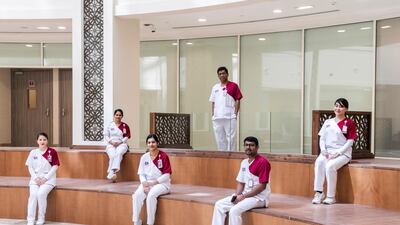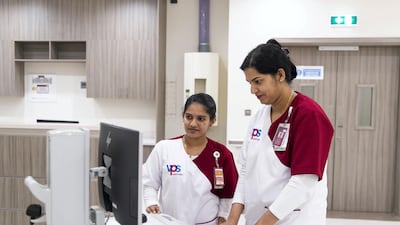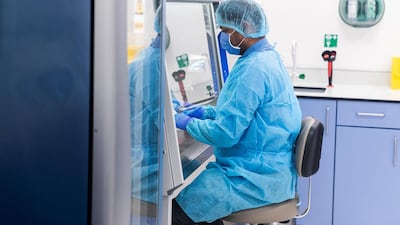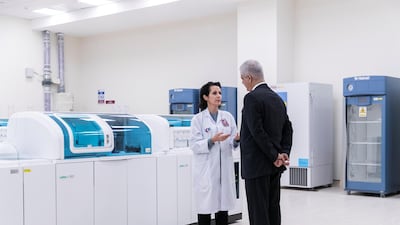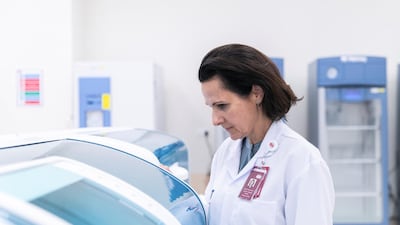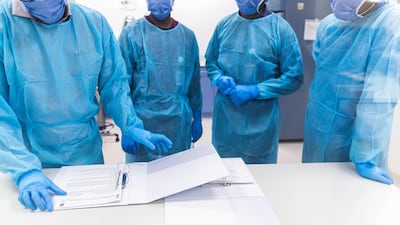Standing at the entry gates to the nation, brave volunteer nurses at Abu Dhabi International Airport put themselves first as they screened hundreds of passengers for Covid-19.
In a military-style operation, a team of nine experienced nurses from India, Pakistan and the Philippines swabbed hundreds of passengers for two weeks before letting them enter the UAE.
Despite uncertainty and fear about the global threat from the novel coronavirus, selfless carers stepped forward to “do their duty”.
One night, faced with a tsunami of passengers, nurses said they tested more than 4,200 for the virus.
Elsa Rani James, 35, an Indian nursing supervisor who has been 14 years in the job, was compelled to help when her employer VPS Healthcare offered to help out with airport volunteers.
“I chose to do this job, to support society and this country,” said Ms James, who has a husband and three young children.
“I accepted I may get the virus by doing this work, and I did not want to give it to my family.
“There was no fear inside me.”
Armed with nasal-swab testing kits and little more than surgical gowns, masks and gloves for protection, Ms James was one of nine nurses contracted by airport health provider Response Plus Medical to test all arriving passengers.
The operation began in early March, as authorities tried to contain the spread of the global pandemic.
While airports have become the new front line in the war on coronavirus, the nurses wanted only to perform their jobs swiftly and efficiently.
“We explained to every passenger how the test would work before inserting a nasal swab,” said Filipino Melody Bacor, 30, who has been nursing for seven years.
“It was important to explain that the test would not hurt.”
Nurses would mark each sample tube with the details of the passengers, then placed them into a cool-box to be taken away for analysis.
Those who tested positive were later tracked down and quarantined.
Like her colleagues, Ms Bacor was tested every couple of days during her two-week airport stint.
All the nurses were considered high-risk but are virus-free.
“I wanted to be sure I was safe and not likely to pass it on,” she said.
“Some cabin crew were reluctant to be tested, as they were travelling so much.
“I tried to tell them it was for their own good. Some were panicking as they were flying twice a day.”
Tens of thousands of swabs were taken from passengers arriving at terminals one, two and three.
George Masih, 41, from Pakistan and a nurse of 17 years, worked for 13 days straight, testing for Covid-19.
He took special precautions to reduce potential exposure.
“This is the first time I have experienced anything like this,” he said.
“We could only sleep for two or three hours between shifts.
“I would go home, then immediately put my clothes into the wash and have a bath in hot water.
“We were constantly changing our protective equipment during the 12-hour shift.”
Passengers arriving from the UK were impressed with the precautionary measures, as British airports had yet to implement similar testing procedures.
“They were very surprised we were testing them, and asked why we were being so cautious as there was no such testing happening when they left home,” Mr Masih said.
“That has all changed now.”
Before being tested, travellers showed their boarding passes at a registration desk, then queued up to be checked.
Nurses would screen arriving passengers by taking their temperature and swab, before stamping passports with stickers to allow them to continue their journey.
The process would take anything from two to four hours and reports came back less than 48 hours later.
Maneesh Babu, 36, an Indian nurse with 13 years’ experience, worked for 11 consecutive days during the rigorous clampdown.
“Like all of us, I wanted to volunteer and help where we were needed most,” he said.
“When terminal one was closed, all the flights were arriving at terminal three, so we were overrun with passengers.
“When I went home after my shift, I did not use the lift and took the stairs. I did not want to contaminate anyone else in case I was infected.”
One flight from Syria was particularly difficult to manage as all passengers were eager to be tested.
A team of nine nurses worked night shifts from 6pm to 6am, alternating with an equivalent 12-hour routine during the day.
Kasserine Libot, 29, a nurse from the Philippines who qualified in 2013, worked the last night stint on Thursday before nurses from the Department of Health took over airport operations.
“Most of us have family and children at home, so it was something we had to think carefully about,” she said.
“We took the oath of nursing, so we have to stick to that to help our community. Otherwise, what is the point of doing what we do?
“The airport officials would tell us what plane was landing, how many passengers to expect and where they had flown in from so we knew what to expect.
“We had to wear personal protective equipment at all times – it was very uncomfortable.”
The nurses have been relocated to the new Burjeel Medical City hospital in Mohamed Bin Zayed City.
A basement pathology laboratory capable of turning around results of up to 100 nasal swabs a day is available to medics.
Anjali Nair, 27, an Indian nurse for two years, is glad to be back in the relative safety of the cancer hospital, as all inbound, outbound and transit flights will be suspended within the next 48 hours.
“I felt no stress with seeing a planeload of passengers arriving from Iran, China or Italy where we knew there were many cases of the virus,” she said.
“We tried to stay calm at all times. The airport is a very different place now.”
